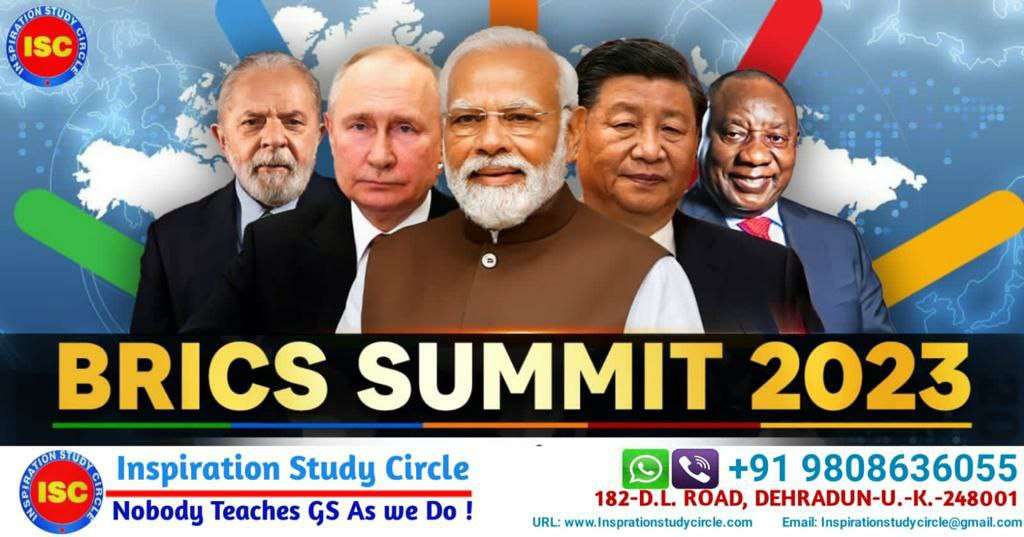
UPPSC- 2026 Calendar Released
UPPSC- 2026 Calendar Released Table of Contents UPPSC- 2026 Calendar Released Brought to you by Inspiration Study Circle UPPSC- 2026
The BRICS Summit 2023, the fifteenth BRICS summit, was an international relations conference attended by the heads of state or government of five member countries: Brazil, Russia, India, China, and South Africa. South African President Cyril Ramaphosa and the leaders of 67 countries were invited to the summit.

It was the first in-person summit of BRICS comprising Brazil, Russia, India, China, and South Africa, since 2019 and was chaired in Johannesburg, South Africa.
The World Leaders from the different Nations held productive discussions on global economic recovery, cooperation with Africa and the Global South, and progress on the BRICS agenda. The Summit gave a platform to discuss issues of concern for the Global South and other areas of development.
Prime Minister Shri Narendra Modi participated in the 15th BRICS Summit held under South Africa’s chair-ship, in Johannesburg on 23 August 2023.
During his address, PM Modi called for a strengthened BRICS that will be:
B – Breaking barriers
R – Revitalising economies
I – Inspiring Innovation
C – Creating opportunities
S – Shaping the future
The Johannesburg II Declaration is an official agreement among the member nations during the 15th BRICS Summit 2023. The Declaration is jeweled with a Preamble with cruxes on Inclusive Multilateralism, Environment, Peace and Development, Mutually Accelerated Growth, Sustainable Development, People-to-People Exchanges, and Institutional Development.
The Preamble:
Disclaimer: The article is based on the following sources of information: The Press Bureau Information of BRICS Summit 2023, and Indian Express.

UPPSC- 2026 Calendar Released Table of Contents UPPSC- 2026 Calendar Released Brought to you by Inspiration Study Circle UPPSC- 2026

Inspiration Study Circle: UPSC CSE 2026 Notification Out Table of Contents Inspiration Study Circle: UPSC CSE 2026 Notification Out UPSC

Explained: Union Budget 2026- 27 and the Economic Survey 2025-26 Table of Contents Union Budget 2026- 27 and the Economic

Target UPSC 2026: Best UPSC 2026 Coaching Table of Contents Inspiration Study Circle- Best UPSC 2026 Coaching UPSC Exam 2026

UPSC 2026 Notification Postponed Table of Contents UPSC 2026 Notification Postponed UPSC Exam 2026 is an All-India Civil Services Exam

Inspiration Study Circle- Best UPSC 2027 Coaching Table of Contents Inspiration Study Circle- Best UPSC 2027 Coaching UPSC Exam 2027